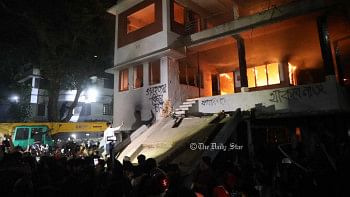Primary schools barely looked after

A major project to build more classrooms, sanitation facilities and make other improvements in primary schools has not made much progress in six years while the poor environment continues to harm learning and teaching.
Two-thirds of the components of the Fourth Primary Education Development Programme (PEDP-4), related to improving the quality of primary education, were unimplemented till May, according to a Planning Commission report.
The Tk 38,291 crore project was launched in July 2018. The government in 2022 extended the duration of the project by two years, setting June 2025 as the deadline.
But as of September, physical work made only 62 percent progress, said Farid Ahmed, secretary to the primary education ministry.
Several project officials said implementation of the project had been almost suspended for the last few months amidst political turmoil.
"It will be next to impossible to complete the project by next June," said an official.
Meanwhile, classrooms remain overcrowded in hundreds of schools across the country and children spend hours at schools with poor sanitation facilities.
Prof Manzoor Ahmed, who is the chief of a government committee to recommend how primary education can be improved, said the delay in the implementation of the project would affect children's learning.
The authorities should investigate why the much-needed programme was not implemented, said the professor emeritus and founding director of BRAC University's Institute of Educational Development.
Secretary Farid said project implementation had been slow in recent weeks because "we need some opinions from the Planning Commission and the Economic Relations Division regarding revisions to certain components".
"We hope everything will be sorted out by this month," he said.
In 2020 and 2021, the implementation made less than 10 percent progress due to Covid-19 restrictions, he said.
The unimplemented components of the PEDP-4 project will be included in PEDP-5, he added.
Educationists often say a lack of proper teaching, crowded classrooms, poor student-teacher interaction, and inadequate infrastructure are affecting the quality of primary education.
According to the Directorate of Primary Education's latest National Student Assessment published in August 2023, 61 percent of the third graders and 70 percent of the fifth graders do not have the maths proficiency appropriate in their grades.
Besides, 51 percent of the third graders and 50 percent of the fifth graders lack competence in Bangla.
Of the PEDP-4's Tk 38,291 crore budget, the government is funding Tk 25,561 crore, and development partners are lending Tk 12,730 crore.
The objective of the project is to improve the quality of teaching-learning in schools so that students acquire competencies.
It also aims to recruit 61,000 teachers, train 1.40 lakh current teachers, build 50,000 classrooms, 10,500 rooms for head teachers, 58,000 WASH (water, sanitation and hygiene) blocks with washroom facilities, and renovate 42,000 primary schools.
Farid said around 37,000 teachers were appointed last year and the process of appointing another 14,000 was going on.
As per a report on the PEDP-4 project, as of May, only 36 percent of the components for quality education were implemented. The implementation rate was 49 percent of the components for access and participation, and 57 percent for management and governance.
Rasheda K Choudhury, executive director of Campaign for Popular Education, said ensuring the quality of education is far from what is desired.
"If we do not ensure quality, we will fall behind in fulfilling the desire of elevation to a middle income country. We can make big structures, but there will be a dearth of people to run them," she added.
The PEDP-4 report by the Implementation Monitoring and Evaluation Division says there were 342 activities under the broader categories of access and participation, quality education, and management and governance.
As of May, the implementation of 132 of the activities was yet to start.
Of the classrooms, 21,668 are done and 17,192 are being constructed; tenders for building 3,365 head teacher's rooms have been invited, 2,222 contracts signed, 250 constructions are completed, and 1,972 being constructed.
Of the WASH blocks, tenders for 50,704 have been invited, 40,071 contracts signed, and 23,172 constructions are done.
Secretary Farid said, "We hope the work will pick up pace in thecoming months."
He added that teachers' training will be prioritised in PEDP-5.


 For all latest news, follow The Daily Star's Google News channel.
For all latest news, follow The Daily Star's Google News channel. 



Comments